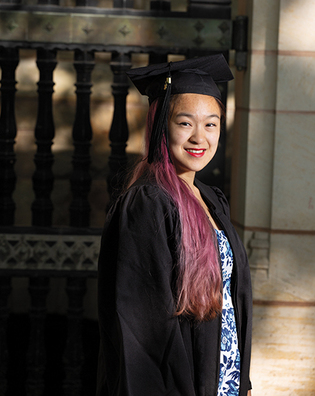
Mark Ostow
Katherine Lin
Morse College
BS, Biomedical Engineering
Holmdel, New Jersey
What’s next for you?
I have a summer journalism fellowship to go to Austria.
But didn’t you major in biomedical engineering?
That didn’t stop me from taking a lot of writing classes. This fall, I took long-form narratives with Sarah Stillman [’06] and wrote about paramedics; I spent so many weekends following them to 911 calls. Journalism is just an excuse to learn random things. Who lets a rando into a fly car [an SUV that responds to emergencies]? Either you’re a journalist, or you’re probably going to be a paramedic.
What will you write about in Austria?
Glacial archeology. Everything is melting. Thanks, global warming. So a lot of artifacts are coming up. Stuff that’s preserved in the ice is mostly organic matter [which rots quickly in the air]. Once it’s exposed, it’s like a ticking clock.
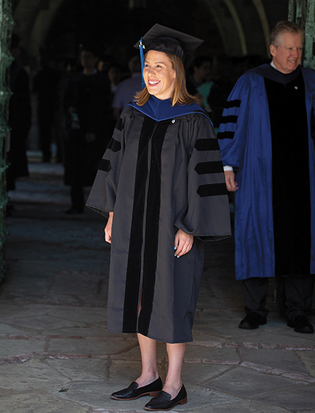
Mark Ostow
Tess Lanzarotta
PhD, History
Nanaimo, British Columbia
How did you spend your free time in the past few years?
I was part of a jiu-jitsu community in New Haven. It draws people from all walks of life. I like learning about how different people move through the world, and I like that I can communicate my experiences to them. When you’re associating only with other graduate students, you have a shorthand about the experience of being an academic. It’s good to try and explain that to people who aren’t in your world.
Tell me about your research.
My dissertation is on the history of biomedicine in Cold War Alaska. I look at the intersections of research and care—the ways in which the lines are blurred between being studied and being cared for. I went to Alaska during four summers, to Anchorage, Fairbanks, Juneau, and Utqiagvik, the northernmost point on North America. It’s still commonly known as Barrow, its colonial name.
Do you have a job for next year?
I’ll be a lecturer at Yale in the history of science and medicine. My courses will be a history of global health; Medicine and US Imperialism; The History of Drugs; and a class on indigenous peoples’ encounters with colonial science.
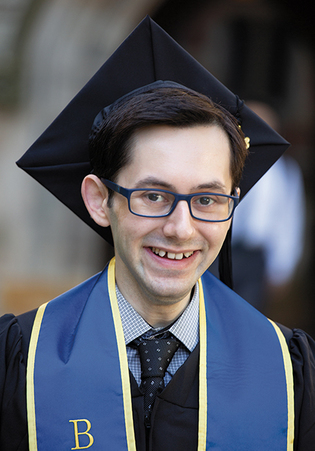
Mark Ostow
Francesco Bertolini
Branford College
BA, American Studies
Yardley, Pennsylvania
What classes have meant the most to you?
US Lesbian and Gay History gave me an understanding of who I am in a historical context, why gay culture is what it is. Professor [George] Chauncey [’77, ’89PhD, now at Columbia University] used to say that nothing in history is inevitable. That fundamentally reshaped my understanding not only of history, but of the world. I never take anything as a given. Everything can change. Psychology and the Good Life took me from an existential question of, “Oh gosh, everything can change, so what am I going to do?” and taught me how you can make sure those changes are for the better. I became more extroverted and more confident. I spent more time with my friends, prioritizing their happiness, which made me infinitely happier.
Do you have plans for next year?
I’d be happy to go into real estate, hotel management, or sales. It’s a lot about how they approach their particular industry. There’s always an iron fist way of doing things and a silk glove way of doing things, and I’m more of a silk glove type of person.
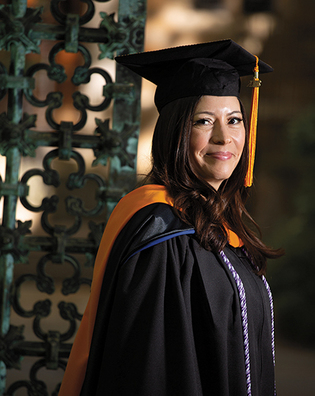
Mark Ostow
Nicole Ganzekaufer
MSN, Nursing
Brooklyn, New York
Why did you become a midwife?
I had another life, doing international development work with a focus on women’s issues. Then I had a baby, and that opened my eyes: I was often not consulted or heard during my labor. Despite our wealth, the US has one of the worst maternal mortality rates in the developed world. Midwives can be part of the solution. As a midwife, I can listen to women and advocate for them.
I read that tennis star Serena Williams faced life-threatening complications during her daughter’s birth last fall.
It’s true. Whatever their socioeconomic status, black women and black babies face substantially worse outcomes.
Have you delivered any babies?
Yes, during this program I’ve caught 45 babies, including twins, which was very exciting. Before coming to Yale, I worked as a doula [providing skilled labor support], and I’ve seen that birth can be beautiful across the spectrum, from homes to hospitals.
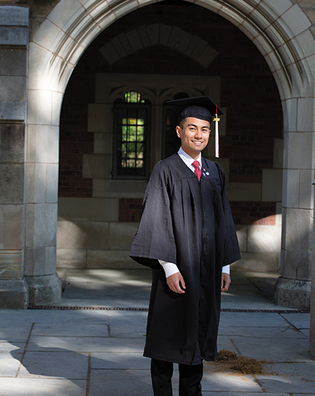
Mark Ostow
Andrew Thavychith
Berkeley College
BA, History
Conover, North Carolina
What aspects of history appeal to you?
National identities and their determinants are interesting. One growing area of study is culinary nationalism. For my senior essay, I looked at the Michelin Guides. Michelin is this tire company that publishes a handbook ranking restaurants. I wanted to see if this guidebook informed, modified, or further developed French national identity.
Have you eaten at a Michelin-starred restaurant?
I’ve been to a handful. Café China in Midtown is really great. Many of their entrees are reasonably priced at under $20, which is an amazing deal.
Do you have plans for after graduation?
I’m going to work at Caine Mitter and Associates, a New York firm that advises [government agencies] on housing projects throughout the US. I volunteered a lot with the Yale Hunger and Homelessness Action Project and learned that many people in New Haven, and in many cities, don’t have stable housing, and the shelters are at capacity or overflowing.
Did anything at Yale surprise you?
When I visited Yale, I saw how absolutely kind people are and how willing to welcome people, no matter where they come from or what they want to be.
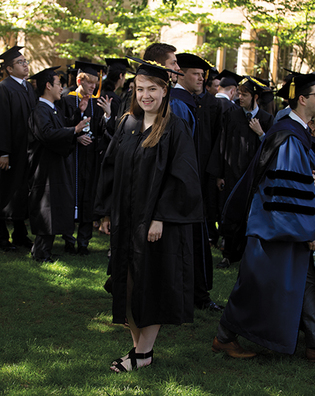
Mark Ostow
Katie Martin
Pierson College
BA, Linguistics
Toronto, Ontario
How did you discover linguistics?
I’m a good advertisement for the QR [quantitative reasoning] requirement, because I took my first linguistics course to fulfill a QR. Linguistics is a nice middle ground between science and humanities, because it applies scientific methods to something that is cultural—language.
What are your post-graduation plans?
I’m going to the University of British Columbia—going home to Canada—for a master’s in linguistics. This summer I’ll be in New Haven working for the Yale Grammatical Diversity Project.
We study syntactic variation in North American English. What speakers can say varies from dialect to dialect. For example, some dialects use double negatives, such as, “Couldn’t neither of them fit in the car.” In other dialects, speakers would say that’s an incorrect sentence, grammatically.
 loading
loading